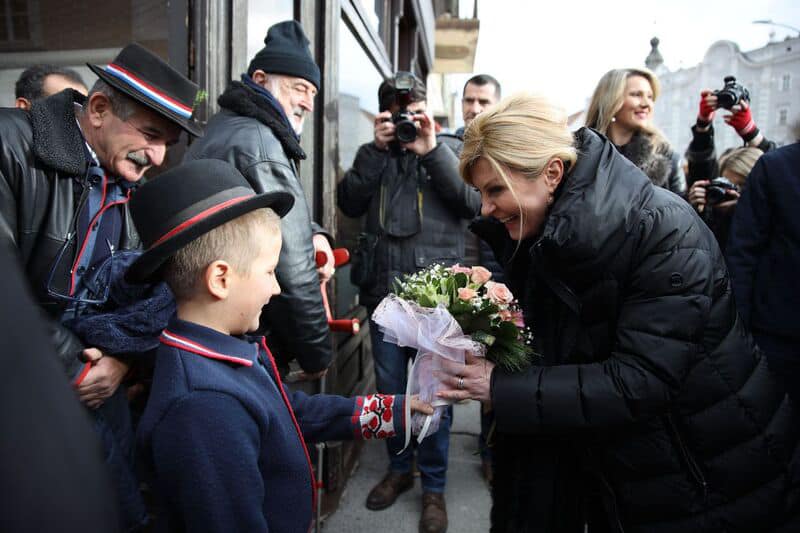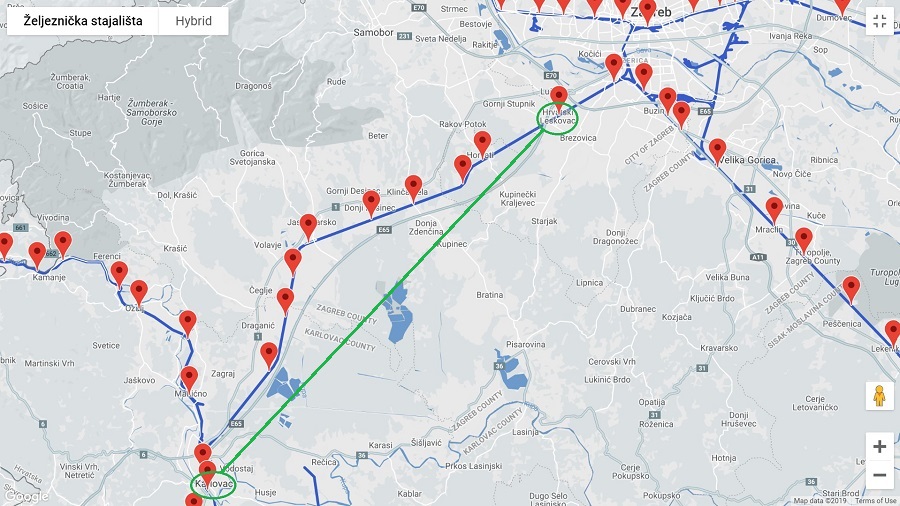Majstori are in Great Demand in Croatia and Germany
Croatia is already feeling the consequences of Germany's enormous need for majstori because it is increasingly expensive to find one in Croatia. And in Germany there is also a huge shortage for majstori in almost all professions.
Majstor (Croatian) - A repairman, craftsman, tradesman or artisan. Plural: Majstori
Good Affordable Majstori are Difficult to Find in Croatia
To install tiles, paint an apartment, or for a larger and more complex procedure such as installing a central heating system – finding the right majstor happened through word-of-mouth from friends and acquaintances who had good - or not so good - experiences. But a different kind of search has been going on for a long time. And it is well known that majstori operate on a different calendar than the Gregorian one.
There are still good majstori in Croatia, but they are available for a considerable price. And it is becoming more common that majstori who used to be available for work have simply vanished. They have left – to Germany or to another EU country, according to Anđelko Šubić/DW on December 27, 2019.
Eight Months and Counting for Majstor Return
I’ve had my own experience with majstori in Croatia. As of today, I’ve waited over eight months for a majstor to return and fix my running toilet. He said he’d be back in a week. In the meantime, I’ve used a clothespin to stop the water from running. This temporary solution is not only essential for conserving water but important because there is only one water meter for our entire eight-unit apartment building and the water bill is divided evenly among the number of (claimed) occupants.
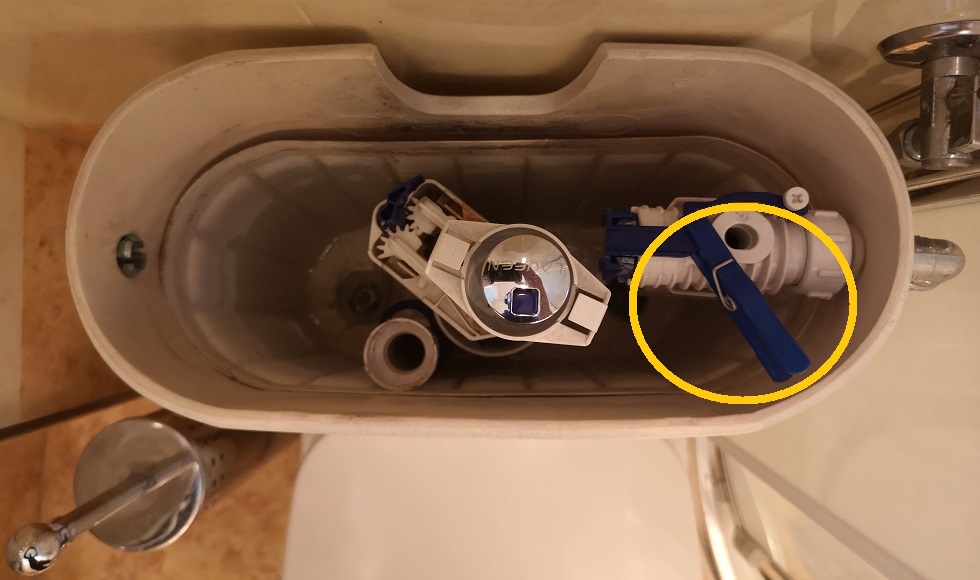
The Author's Croatian Toilet Tank
Of course, I would have fixed the toilet myself long ago, but my Croatian toilet tank is crammed with complex plastic gears, levers and springs. Here is a diagram of a typical toilet tank made in the USA for comparison.
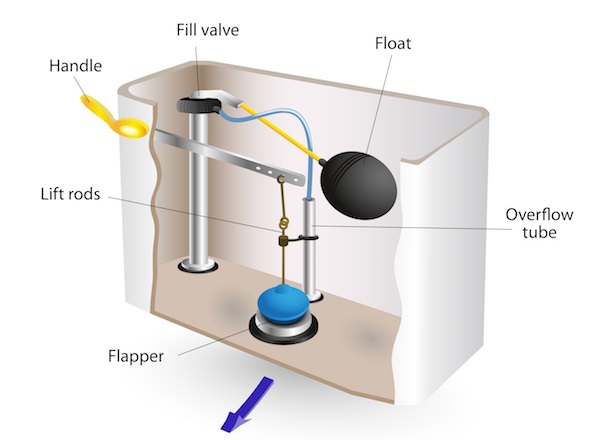
A Typical Toilet Tank in the USA
Germany Needs Croatian Majstori Too
The president of the German Craftsmen's Association Hans Peter Wollseifer claims that there is still a huge need for majstori in Germany too. And they are needed in almost all sectors: from construction, sanitary installations and assemblers to road construction workers and telecommunications technicians. There is also a shortage of butchers and specialists in the food sector too. He claims that workshops have to regularly turn down jobs because they do not have enough people, and this isn’t just impacting private jobs: the scale of this shortage could also jeopardize major economic ventures such as rebuilding German highways and bridges and establishing a better telecommunications network.
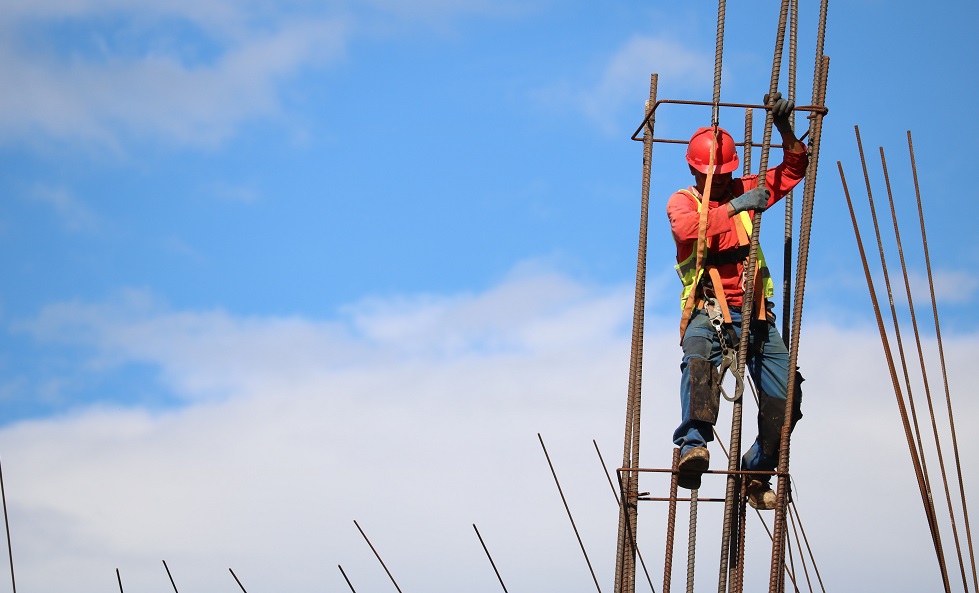
Josue Isai Ramos Figueroa | Unsplash
Detlef Scheele, the head of the German Employment Bureau, confirms that craft workshops can barely afford to fire anyone. Wollseifer claims that another 30,000 majstori will be able find work across the board and that the new Law on the Employment of Professional Workforce from Non-EU Countries, which will go into effect in early March, shows promise. "It is clear to us that there won’t be a third of all 30,000 majstori standing at our doorstep," Wollseifer says. Maybe a few will come first, but he is convinced that more will arrive, maybe not 30, but closer to 50 thousand in the end. Nevertheless, there will be work for them over time.
Therefore, he advises German politicians, give majstori from abroad a full and friendly welcome. The industry ultimately depends on the infrastructure that the majstori need to build and renovate - and everyone will be in trouble if that doesn’t happen.
Germany No Longer Number One Majstor Destination
"We need to make Germany more attractive as a destination. Not only are the majstori coming, but their families are joining them as well. This is different than the “gastarbeiters” of the 1960s (who arrived in Germany alone and periodically returned home to their families abroad), and we have to consider this from the beginning,” Wollseifer points out.
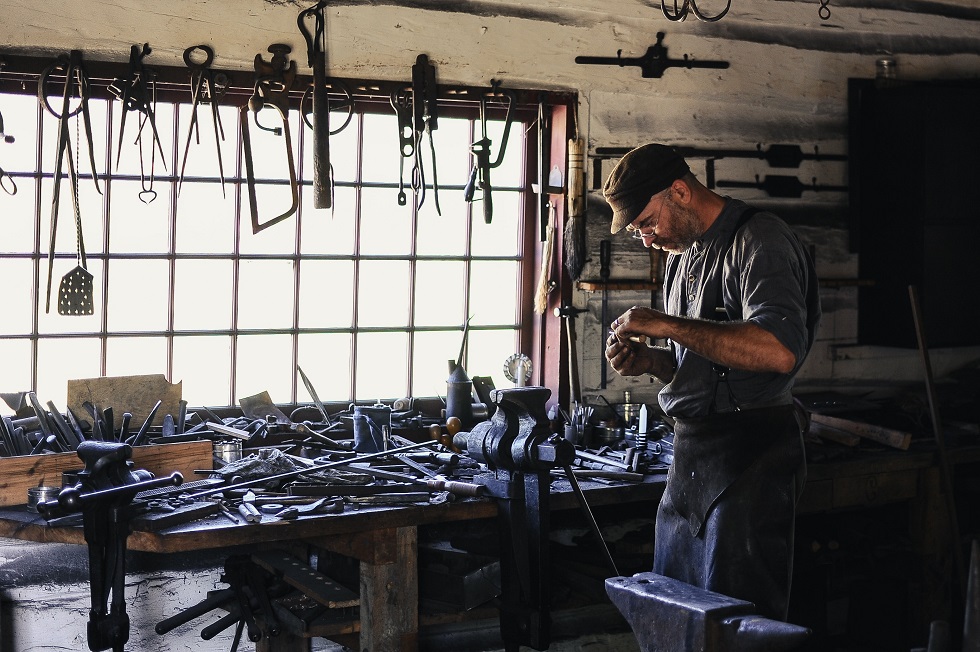
Clark Young | Unsplash
But it is also a fact that Germany as a destination is only moderately interesting to majstori. According to research by the Organization for Economic Co-operation and Development, Germany ranks only twelfth among developed nations in terms of attractiveness. Yes, the hourly rates are not bad here, but taxes and levies are also high. It is also expensive to live in Germany, especially if you come with a family. And the country is still suffocating in administrative paperwork, which could be fatal for Germany. This is especially true for professionals from outside the EU, and the big question is whether their qualifications will be recognized in Germany or they will have to go back to school.
Several countries in the European Union are much less fixated on certificates and papers – provided that the work is done well. And it seems that in this regard, Croatia took the German path long ago - of course, but without the German salaries.
Majstori were the subject of a 2013 Croatian comedy directed by Dalibor Matanić:
Follow our Business page for updates on the majstor shortage and other job market news in Croatia.
Croatian State Roads to Get Traffic Cameras: 'Big Brother' Expands
Watch how you drive in the Croatian countryside! Traffic 'big brother' is coming to state roads too. Forty new cameras will be installed throughout Croatia next year and camera traffic surveillance data will be collected and analyzed at a new center under construction in Karlovac.
Croatian State Roads Will Get Traffic Cameras Too
Following the widespread installation of police cameras and the introduction of motorway speed cameras, new traffic surveillance cameras will be coming to state roads next year, They will be used for traffic control and all data will be collected at the Središnji centar za upravljanje prometom (Central Traffic Management Center) in Karlovac, which is currently under construction, according to ŠibenikIN on December 26, 2019.
Two locations in each county will be under the watchful camera eye and more than 40 cameras will be installed on state roads next year. The footage will be collected at the Central Traffic Management Center, which has already received 6.5 million HRK (872,500 EUR) in funding.
Cameras Will Monitor Traffic 24 Hours a Day
The new cameras will allow traffic to be monitored 24 hours a day from a single application and will also capture vehicle license plate numbers. Croatian citizens, residents and tourists will have access to road and weather information on an app at any time of day to help plan travel.
"If someone wants to cross the border crossing at Kostajnica, they will be able to see a real-time image showing whether a line has formed at that border crossing and can choose an alternative less-crowded border crossing if necessary. Drivers can also see whether there is a line at a traffic light in Varaždin, for example," Slaviša Babić of Hrvatske ceste (Croatian Roads) explains.
Traffic Violators Will Not Face Prosecution
Although the new cameras will record speeders and drivers who run through red lights, the surveillance technology will not be used to prosecute drivers.
"This again demonstrates an overall lack of coordination and systemic accountability, because non-sanctioned surveillance will not be as effective as it could be. This surveillance camera technology is only being used at ten percent of its potential," explains Željko Marušić, a traffic expert.
The test phase of the project is expected to be complete in October next year, and by 2025 cameras will be deployed at 300 locations throughout Croatia, HRT reports.
Follow our Travel page for developments regarding transportation infrastructure and travel destinations in Croatia.
Brijuni Islands National Park: Tito's Former Summer Residence Gets Upgrade
The Brijuni islands, once the private summer residence for Josip Broz Tito, longtime president of former Yugoslavia, is getting a long-awaited renovation. A new catamaran will allow access to both islands for the first time and dormitories are being updated for education and research projects.
According to Barbara Ban/Novac/Jutarnji List on December 29,2019; Tito’s legendary cinema is also getting a facelift and tourist facilities are undergoing upgrades. Those upgrades include a new information center and an updated Natural History Exhibition. Trains will allow tourists with disabilities to see all of Veliki Brijun, the larger of the two islands.
Recently, a contract to build an aluminum catamaran for the Brijuni islands was signed at Tehnomont Shipyard in Pula. It is a 15.5 million HRK (2.1 million EUR) investment, and this ship will be able to transport visitors to Mali Brijun, the smaller of the two islands, for the first time. Sveti Nikola Bay on Mali Brijun has a jetty dating back to the Austro-Hungarian Empire, which was so shallow that the previous excursion boat couldn’t dock there. Therefore, Mali Brijun has been largely neglected, since visitors could only reach it as part of an organized group and smaller boat. On Mali Brijun they could see a performance at the Ulysses Theater. This will be now be possible on a regular basis, and the ship should be finished in 18 months, which means that the Brijuni islands will offer more tourism opportunities when the 2021 season begins.
Ulysses Theater on Mali Brijun
Biggest Brijuni Islands Investment in Over a Decade
But this is only a part of a larger plan, and the largest investment on the Brijuni islands in the last decade, and beyond. It’s worth pointing out that billions are not involved, considering that big numbers are often mentioned when it comes to investing in these interesting islands. Recall that not long ago there was a plan to completely renovate the hotels and villas and add facilities and accommodations. It would have been a 250 million EUR investment, and the names of well-known worldwide luxury chains were being mentioned to run these hotels and attract the elite back to the islands, as they had done back in the 1920s and 1930s. Very little remains of that elite past and the islands still await the government’s next move. But governments and ministers with big plans have changed as the years have passed. Now the future of the Brijuni islands is no longer on hold.
In any case, opportunities to finance projects are being taken advantage of wherever they arise, and one of those is the Novo ruho Brijuna (New Brijuni Outfit) project which is worth 41 million HRK (5.5 million EUR). This project is being funded by the European Regional Development Fund. Ten percent of the funding is coming from the Environmental and Energy Efficiency Fund, and the rest from public institutions. This is a small sum when compared to more ambitious investment proposals, but it is noteworthy and will provide more tourism opportunities for the only national park on the Istrian peninsula. Finally, Mali Brijun will be available to a wider group of visitors, and that’s where the largest construction project is being planned.
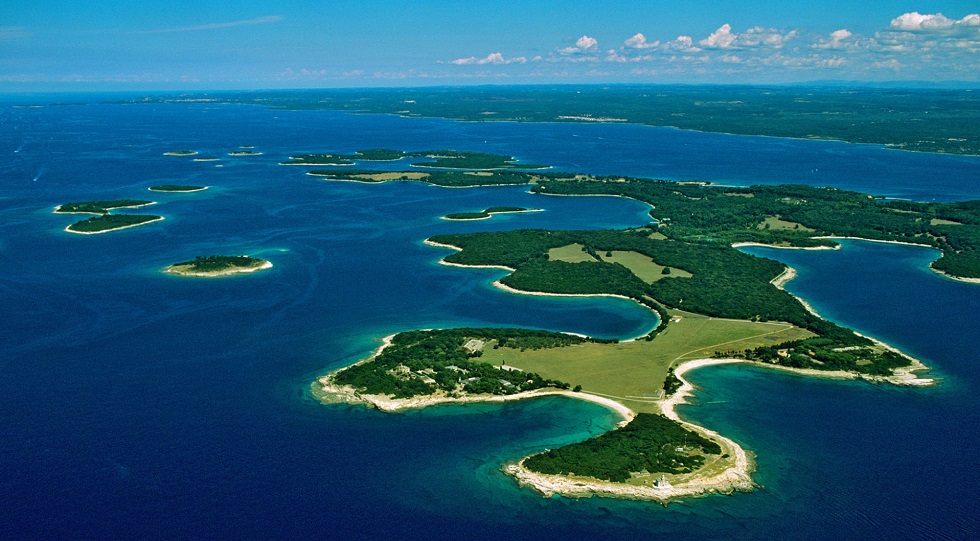
Dormitories Renovated for Research and Education
“We plan to renovate seven facilities next year. These are former military dormitories at Sveti Nikola Bay. They will be updated and returned to their original use. The dormitories won’t house the military, but are intended for nature schools, for scientists, divers, researchers and even artists. Therefore, the purpose of these dormitories is to serve these groups who conduct their summer activities at the island. The updated dormitories will have about 70 rooms with bunk beds. They will be simple buildings with sanitary facilities. Some rooms will have their own bathrooms, and some will be equipped with common bathrooms,” says Masa Mihelić, who runs this European project on Brijuni National Park, and hopes that after this project there will be many others which will increase the tourist capacity on the island.
She also points out that the kitchens will be arranged among the seven facilities to serve guests’ needs. One kitchen will be used at the information center and another will be for other facilities, such as laundry and storage. Mihelić emphasizes that these new accommodations in Brijuni are not intended for the typical commercial tourist who might otherwise visit Veliki Brijun.
“We are placing emphasis on the educational research and cultural importance of this project. Larger groups will always be accommodated here, so the facilities cannot be used for individual purposes,” she explains.
Most of these facilities are not being used now and are in rather poor condition. One facility currently has a janitor, and another stores firefighter equipment. These investments will make this section of the national park come back to life. However, although construction has already begun and was expected to be finished by the start of this season; it has not gone as smoothly as planned, unfortunately. The completion of project had to be extended to 2021, Mihelić points out.
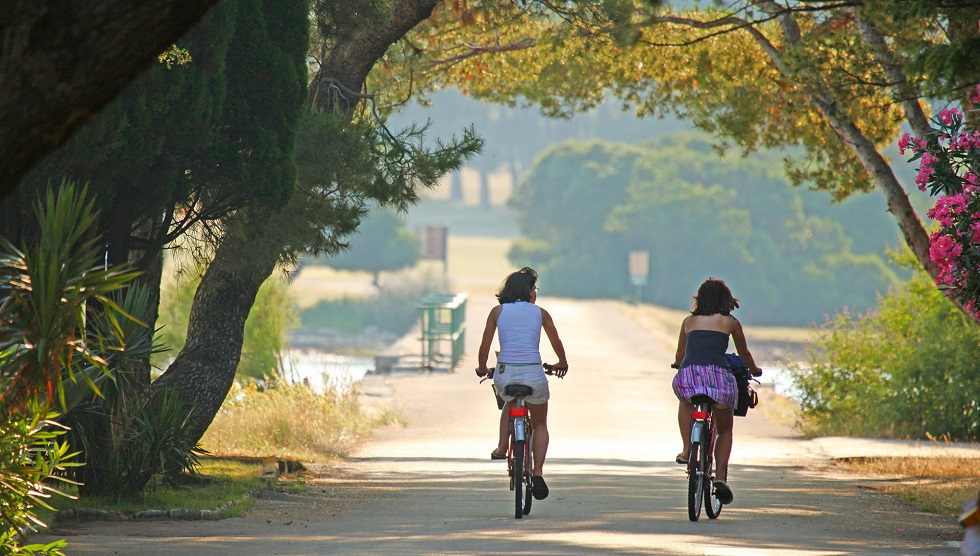
Mali Brijun Project Completion Postponed to 2021
“The project should have been completed by April 2020, but this will not be possible because of unforeseen circumstances. The pier on Mali Brijun collapsed and needed to be repaired. That became a multi-million EUR project, and our institution had to focus all its resources to address this issue. The rehabilitation of the facilities can begin only after this construction is completed,” Mihelić explains.
Their most significant accomplishment was choosing a contractor for the 150-passenger boat. One hundred of those seats will be inside the boat and accessible to people with disabilities.
New Catamaran Will Access Both Islands
“This boat will allow us to reach Veliki Brijun and Mali Brijun from Fažana. At the same time, the ship’s route will connect both islands. Then we will be able to organize a full day trip to Veliki and Mali Brijun. There will also be an option to go directly to Mali Brijun. Presently, it is only possible to visit that island as part of a special tour, but those had to be booked with advance notice and smaller groups. Special transport had to be used, which is why the trip was so expensive. This project will open the island to the general public and make the trip available to a wider audience,” points out Mihelić, who is the head of the largest EU project ever conducted on the Brijuni islands.
Veliki Brijun Renovation on Schedule
But no matter how far that project has fallen behind schedule, the rest of the renovation is being carried out according to plan. Therefore, by the end of this season, an information center had already been set up in Veliki Brijun, with an interactive screen presenting all the islands’ attractions. Two modern trains were purchased to transport tourists, and these allow people in wheelchairs to sightsee the island for the first time. The well-known Natural History Exhibition has been modernized and several new acquisitions are underway, as this is a complex project which will provide numerous new educational and tourist facilities. Tito's Summer Cinema will also get a new face.
Tito’s Cinema Gets Facelift
“It is a legendary cinema where Tito watched all the films which came to the Pula Film Festival, before their official screening. This space will be able to be used by cultural anthropologists when it is renovated and will feature long and short films on nature. So far, we have purchased 300 video clips from the archives of the former (Yugoslav) state in Belgrade which show the Brijuni islands from the 1950s to the 1980s. All of these films will be shown at the summer cinema,” the project manager points out.
Elizabeth Taylor and Richard Burton visit Tito on Brijuni Islands
And that's not everything. As part of the trip, the Brijuni islands will offer more than just a train ride and a visit to a safari park. That's why they are also designing 11 new attractions including promenades, stone stories, and educational trails.
For more information on tourist destinations and developments in Croatia, follow our Travel page. Check out the Brijuni Islands National Park website here, YouTube page here, and Instagram page here for more information and reservations.
2014 Best Croatian Promotional Film | Zagreb TourFilm Festival | Croatia
Croatia Sparkling Wine Exports Exceed 2018 Output in Nine Months
In the first nine months of 2019, Croatia exported 683 million EUR of sparkling wine. The production and export of Croatian sparkling wine is on the rise and exports within first nine months of this year have also exceeded that of 2018.
First Nine Months of 2019 Exports Exceed 2018
From January to September of 2019, Croatia exported 476 hectoliters of sparkling wine compared to a total of 441 hectoliters last year, the Croatian Chamber of Commerce (CCE) announced, according to Novac/Jutarnji List on Friday, December 27, 2019.
"The production of local sparkling wines is constantly growing, as is its export. More sparkling wines are being made from indigenous Croatian grape varieties, and their quality is becoming more recognized in the most demanding markets. Therefore, with relatively small quantities, we are achieving competitive pricing and hope that this trend will continue in the future," said Žaklina Jurišić, Assistant Director of Agriculture, Food Industry and Forestry from the Croatian Chamber of Economy (CCE), in a statement.
According to the CCE, 476 hectoliters of sparkling wine worth 683 million EUR were exported in the first nine months of this year. Imports slowed down slightly and 12,800 hectoliters worth 7.9 million EUR were imported.
Data for the first nine months show that sparkling wines were the most exported (211 hectoliters worth 546,000 EUR) which were followed by sparkling fresh grape wines with protected trademarks (146 hectares worth 64,000 EUR) and other types of sparkling wine from fresh grapes (92 hectoliters worth 55,000 EUR). In 2018, sparkling wine exports increased 35 percent over 2017, from 748,000 EUR to 1.08 million EUR. Quantitatively, exports are up 117 hectoliters, from 324 hectoliters in 2017 to 441 hectoliters in 2018, according to the CCE.

Most Croatia Sparkling Wine Exports to The Netherlands
Traditionally, most sparkling wine is exported to the Netherlands (346,500 EUR), followed by Italy (178,100 EUR) and Germany (140,300 EUR). Interestingly, our fourth largest export market is Singapore, which received sparkling wine imports totaling 136,000 EUR last year, CCE reported.
On the other hand, sparkling wine imports have increased in quantity and value. In 2018 sparkling wine imports exceeded 9 million EUR, while imports in 2017 totaled 7.6 million EUR. This is an increase from 14,300 hectoliters to 17,900 hectoliters, the statement read.
Most of the sparkling wine is being imported from France (3.3 million EUR), Italy (2.8 million EUR) and Germany (1.1 million EUR).
According to the Croatian Chamber of Commerce (CCE), the largest quantities of sparkling wine coming into the Croatian market this year are: other types of sparkling wines from fresh grapes (5,000 hectoliters worth 1.1 million EUR), sparkling wines from fresh grapes (2,900 hectoliters worth 1.2 million EUR) and prosecco with trademark-protected labels (2,500 hectoliters worth 1.2 million EUR).
Follow our Made in Croatia page for more information on imports from Croatia.
Croatia President to Debate Former Prime Minister on RTL
Current Croatia President Kolinda Grabar-Kitarović and opponent former Prime Minister Zoran Milanović have officially accepted RTL's invitation to participate in a presidential debate, which will be held at 20h on Monday, December 30, 2019 – according to the television network.
This will be the first debate between the two remaining presidential candidates who entered the runoff after the December 22 elections. The runoff will take place on Sunday, January 5, 2020.
Debate Will Last 60 to 90 Minutes
The debate will be moderated by Damira Gregoret and Ivan Vrdoljak and edited by Ana Bulić on RTL. It will last between 60 to 90 minutes, which is considerably shorter than the first two-and-half-hour debate, which included all eleven first round presidential candidates. As announced, the two remaining candidates will answer questions regarding political, economic, social and other topics of public concern. Each candidate will be given equal time to respond.
During his appearance in Split on Saturday, Presidential candidate Zoran Milanović said that he expects RTL to agree that ideological issues will be kept at a minimum during the upcoming debate with his contender Kolinda Grabar-Kitarović, and that this debate will focus on "development and growth topics".
Debate Won't Focus on Ideological Issues
“I expect questions that will deal with ideology of Tito and team and Pavelic to be kept to a minimum. I will insist on that, because these are the rules of the debate that have been agreed upon. "I want to know the general framework, not the individual issues - this is not HRT (Croatian Radio Television). Of course, I love HRT, but this is a more professional television network and I expect an agreement," Milanović told reporters while campaigning on the Split Riva.
He said he expects to discuss developmental and statehood topics, and presidential powers. He is not interested in having anyone “describe Croatia's policy toward Bosnia in one minute. We got that question at HRT," Milanović pointed out.
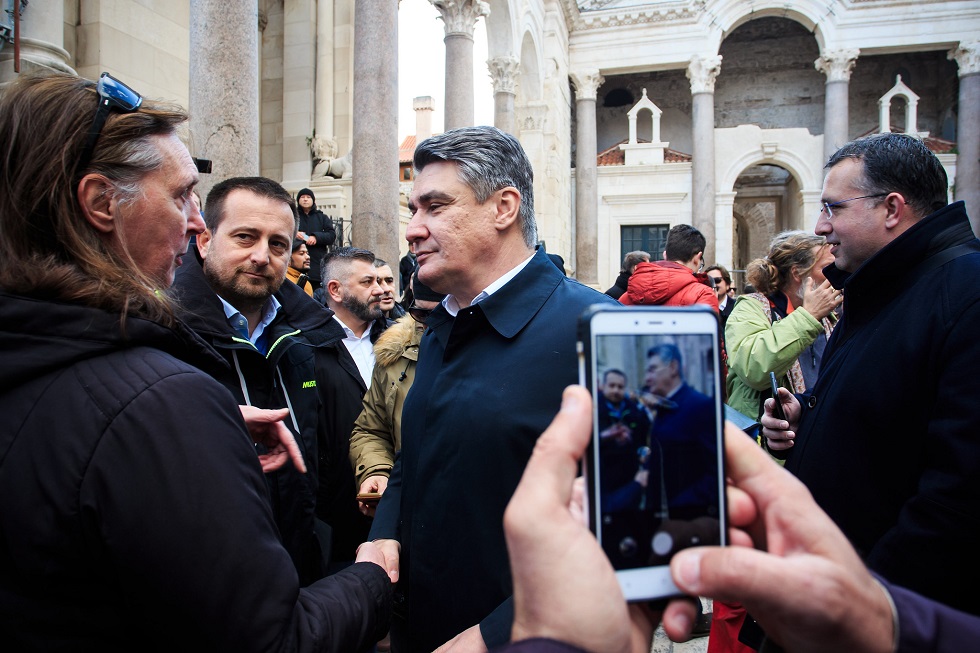
Milanović Notes His Successes and HDZ Failures
Asked why he thought he would be a better president than prime minister, Milanović replied that they were two "substantially different jobs." He claimed that, as prime minister, he pulled the country out of a severe crisis, and that HDZ has increased Croatia’s public debt twice as much as his government had. "Even with the Plenković government, the public debt has grown by almost 20 billion HRK," Milanović said, adding that "within a half year it had paradoxically decreased by three billion during the time of Orešković."
Milanović also asserted that his government was "therapeutic for Croatia, relatively fair, free of affairs, imprisonment and indictments." He said that Croatia had entered a period of "economic expansion" during his government.
"Then comes Kitarović, and we get someone who cannot not read, write or speak Croatian (Tihomir Orešković). Then Plenković shows up and things really haven’t changed much – if at all. We currently live in a time of minimal economic growth," Milanović emphasized. He added that “we rank last in European countries to completely utilize available EU funds.”
Croatia World Superpower in Tourism Only
According to Milanović, under HDZ’s rule, we have failed to integrate into the European and world markets except in tourism where we are a world superpower.
"We live off of peace, stability, warm seas and perhaps too much from selling these resources, and the current president does not understand this," Milanović concluded. "Geopolitics is very important because you need to know whom you associate with and choose respectable partners. However, HDZ and the president have chosen to associate with bad partners."
Croatia President Appeared Alone on N1 Sunday
Despite sending the same invitation to the headquarters of both candidates, N1 did not have official confirmation from either headquarters that the candidates would participate today’s debate on N1. However, the current president and candidate for second term, Kolinda Grabar-Kitarović, showed up.
Her opponent Zoran Milanović did not appear, and Nataša Božić, editor of “Tocka na tjedan” (Topic of the Week) had a conversation with the president, while a chair for her opponent sat empty.
President Clarifies Message to Voters
"I called on the citizens to vote for Croatia for everyone, not for a divided Croatia," the president said, explaining her message to voters to "choose the right Croatia."
"I do not want to divide our country into either us or them, but to vote for Croatia, and unite around common values," said Grabar Kitarovic, who initially told Nataša Božić that she did not tell the voters at the recent Karlovac rally that they were choosing "the right Croatia ".
"I am sending my messages and expect that the Croatian voters will vote based on what I represent and based on my program," she said.
Successes of First Presidential Term
“I have not fulfilled some of my promises, because during my term you could see that some objectives were impossible to achieve or there were other priorities, but this is what I have done,” Grabar-Kitarović said of her achievements in the first term.
"I have saved taxpayers 25 million HRK in five years, which may not seem like much to some people, but if you have a budget that is just over 30 million, then 25 million is a respectable figure," the president added.
President Tells Voters to Circle Wrong Ballot Number
"Dear Voters, I urge you to go to the polls on January 5, 2019 and cast your vote for Croatia and continue the process of growth and development. Vote for a Croatia that knows and can do better, a Croatia that is proud of its values, a Croatia that does have an inferiority complex on the world stage but is an equal participant. I urge you to circle number 1 on the ballot for Kolinda Grabar-Kitarović," the president told voters.
Zoran Milanović, her opponent, is number 1 on the ballot for the upcoming runoff presidential election. The current president is number 2 on the ballot. This is the latest in a series of campaign gaffes by Kolinda Grabar-Kitarović which have led to questions regarding her ability to continue managing the demands of the office.
Follow our Politics page for developments during the final days of the Croatia presidential campaigns. We will be providing by-the-minute exit poll updates and election results after the polls close at 19h on January 5, 2020.
Zagreb to Karlovac in 30 Minutes: Croatian Railways Upgrade Project
The train ride from Karlovac to Zagreb currently takes an hour. A track reconstruction project of the Hrvatski Leskovac - Karlovac railway line, worth 3.45 billion HRK (463.4 million EUR), will cut the train journey to 30 minutes.
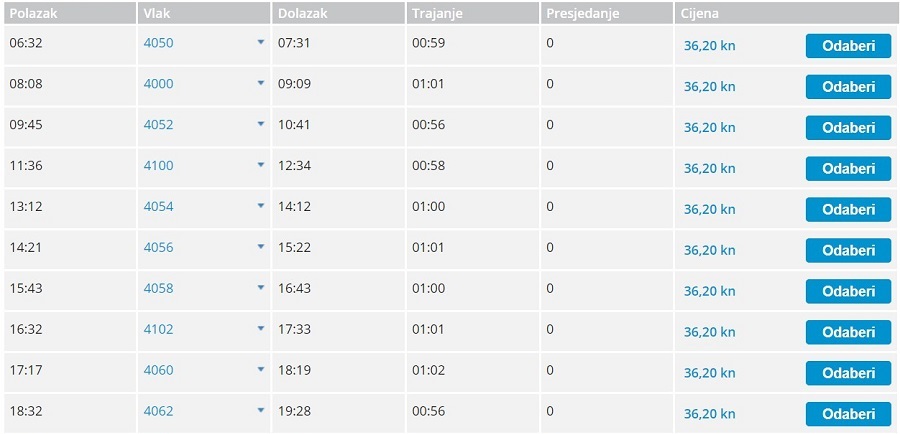
Section of Current Weekday Zagreb - Karlovac Train Schedule | Croatian Railways
Prime Minister Andrej Plenković attended a ceremony in Karlovac on December 27, 2019 to sign the grant agreement for the project to rebuild the existing railway line and construct a second track from Hrvatski Leskovac to Karlovac.
Zagreb – Karlovac Train Speeds to 160km/h
It is a 44-kilometer section of the railway, and its reconstruction and second track upgrade will improve suburban traffic from Zagreb to Karlovac, and is part of a larger project to build a lowland railway from Hungary to the Port of Rijeka, which will improve connections to the markets of Central Europe.
The project encompasses the reconstruction of the existing railway line and the construction of a second track. It also includes the renovation of the Hrvatski Leskovac, Jastrebarsko and Karlovac railway stations, while the Horvati, Zdenčina and Draganići stations will be transformed into stops. The existing stops Mavracići, Desinec, Domagovići and Lazina will also be renovated. The reconstruction of the railway line will include upgrading and modernizing a stable railway track and installing signaling and telecommunications systems, which will enable maximum train speeds of 160 km/h.
Current 44 Kilometer Track Upgrade and Construction | Croatian Railways
Increased Use of EU Budget Funds for Infrastructure
The Prime Minister stressed that it is important that this event is happening just a few days before Croatia takes over the Presidency of the Council of the European Union, according to 01Portal on December 27, 2019.
“In public life, it is important to continue to raise awareness of the added value of EU membership. This project, worth 3.45 billion HRK, of which 2.7 billion are entirely grants from the European budget to Croatia, is another example of how important EU membership is for the development of Croatia, and for the development of transport or railway infrastructure in this particular case,” Prime Minister Plenković pointed out.
Croatia to Invest 3 Billion EUR in Railway Upgrades
He announced that Croatia will invest 3 billion EUR in railway infrastructure improvements over the next ten years. He added that the reconstruction of the main train station in Karlovac was also a sound investment for Karlovac, and an effective use of European funds.
“Karlovac will obtain a modernized renovated station and, most importantly, our Karlovac residents will arrive in Zagreb twice as fast as they can currently,” said the Prime Minister, pointing out the additional value of this project, which increases the overall percentage of fund usage within the EU budgetary framework to 83 percent.
The contract for the grant was signed by the Minister of the Sea, Transport and Infrastructure Oleg Butković, the CFCA (Central Finance and Contracting Agency) Director Tomislav Petrić and the President of the Board of HZ (Croatian Railways) Infrastructure Ivan Kršić. The Hrvatski Leskovac - Karlovac track section is a part of the Zagreb - Rijeka railway line.
Upgrades Underway for Entire Zagreb – Rijeka Line
“Tenders are underway for project studies to upgrade the next two railway sections to Rijeka: Karlovac - Oštarije and Oštarije – Škrljevo. We have obtained the necessary location permits and plans are also underway to improve the Škrljevo - Rijeka - Jurdani section, which is the fourth and final section of the Zagreb - Rijeka railway line,” Ivan Kršić noted.
Follow our Travel page for more information on upgrades to transportation infrastructure in Croatia.
Croatia Presidential Election: Grabar-Kitarović, Milanović go to Round Two
According to election results released at 5h CET (with 99.98% votes processed) on December 23, 2019; Croatia President Kolinda Grabar-Kitarović and former Prime Minister Zoran Milanović will advance to round two of the Croatian presidential elections on January 5, 2020. Miroslav Škoro, a popular folk musician, who was closely trailing Grabar-Kitarović in the early exit polls, will not advance to the second round.
Here is a breakdown of the final results for all eleven presidential candidates:
29.55% - Zoran Milanović – Former Prime Minister | SDP
26.65% - Kolinda Grabar-Kitarović – Current President | HDZ
24.45% - Miroslav Škoro – Folk singer and former Croatian Parliament Representative | Independent
5.87% - Mislav Kolakušić – Former Judge and EU Parliament Representative | Independent
4.61% - Dario Juričan – Legal name: Milan Bandić. Filmmaker and Performance Artist | Independent
2.89% - Dalija Orešković – Former Chair Conflicts of Interest Croatian Parliament | Independent
2.31% - Ivan Pernar – Member of Croatian Parliament | Party of Ivan Pernar
1.12% - Katarina Peović – Former member of Zagreb City Council | Workers’ Front
0.95% - Dejan Kovač – Economist and Princeton graduate | HSLS
0.21% - Anto Đapić – Former Osijek Mayor and Former Member of Croatian Parliament | DESNO
0.15% - Nedjeljko Babić – Regional party candidate | HSSČKŠ
First Woman President of Croatia
Kolinda Grabar-Kitarović, born April 29, 1968; is the fourth and current President of Croatia since 2015. She is the first woman to be elected to the office since the first multi-party elections in 1990. At 46, she also became the youngest person to assume the presidency.
Before her election as president, Grabar-Kitarović held several governmental and diplomatic positions. She was Minister of European Affairs from 2003 to 2005, the first female Minister of Foreign Affairs and European Integration from 2005 to 2008, Croatian ambassador to the United States from 2008 to 2011 and the NATO Assistant Secretary General for Public Diplomacy from 2011 to 2014.
Grabar-Kitarović was the only female candidate in the Croatian presidential elections held in December 2014 and January 2015 and was runner-up in the first round. She proceeded to narrowly defeat incumbent President Ivo Josipović in the second round. Her strong performance in the first round was unexpected, as most opinion polls had given President Josipović a strong lead. In the second round, Grabar-Kitarović defeated Josipović by 1.48%, which was the closest percentage margin of any presidential election to date.
She was a member of the conservative of HDZ (Croatian Democratic Union) from 1993 to 2015 and was also one of three Croatian members of the Trilateral Commission, but was required to resign both positions upon taking office as president in 2015, as Croatian presidents are not permitted to hold other political positions or party membership while in office. In 2017, Forbes magazine listed Grabar-Kitarović as the world's 39th most powerful woman.
Grabar-Kitarović’s 2019 presidential campaign has been marked by a series of gaffes and apparent missteps. She enjoys a warm political association with controversial Zagreb Mayor Milan Bandić, whose party officially endorsed her candidacy. Last week, she claimed during a campaign rally in Osijek that she had secured jobs for Croatian citizens to work from home for 8000 EUR, after they had received training abroad.
After refusing to debate other presidential candidates before the first election round; she relented and agreed to one debate with all eleven candidates on HRT (Croatian Radio Television), a public network frequently accused of favoring the president’s former political party (HDZ). Even though only three of the eleven presidential candidates were consistently polling in the double digits, Grabar-Kitarović refused offers by commercial networks to debate her top two contenders. She justified her decision by indicating that she believed all the presidential candidates should be heard. The resulting debate, which took place just days before the election, was a two-and-a-half-hour fiasco, in which all eleven candidates were given opportunities to discuss their views on abortion, religious education, corruption, border control and gay pride.
Former Prime Minister of Croatia
Zoran Milanović, born October 30, 1966; is the former Prime Minister of Croatia, a position which he held from December 2011 to January 2016. He was the leader of SDP (Social Democratic Party of Croatia), the largest centre-left political party in Croatia, from 2007 to 2016. He served as Leader of the opposition twice, from 2007 to 2011 and from January to November 2016, when Davor Bernardić succeeded him as SDP leader.
After graduating from the Zagreb Faculty of Law, Milanović began his career the Croatian Ministry of Foreign Affairs. He served as an advisor at the Croatian Mission to the European Union and NATO in Brussels from 1996–99. In 1998 he earned his master's degree in European Union law at the Flemish University in Brussels and was an assistant to the Foreign Minister of Croatia for political multilateral affairs in 2003.
In June 2007 he was elected President of SDP, following the death of Prime Minister Ivica Račan. In 2011, Milanović initiated the formation of the Kukuriku coalition, uniting four center-left political parties. The coalition won an absolute majority in the 2011 parliamentary election, and SDP became the strongest party in parliament. Milanović became Prime Minister on December 23, 2011, after the parliament approved his cabinet.
Milanović’s term as Prime Minister was marked by Croatia's entry into the European Union. His cabinet introduced changes to the tax code, passed a fiscalization law, and began several large infrastructure projects. Milanović also supported the expansion of same-sex couples rights and introduced the Life Partnership Act.
Following the 2015 election, he was succeeded as Prime Minister by Tihomir Orešković. Milanović led the four-party coalition until the early parliamentary elections in September 2016. Following a surprise defeat, Milanović announced his withdrawal from politics. He then entered the consulting business and worked as an advisor to Albanian Prime Minister Edi Rama.
On June 17, 2019; Milanović announced that he would be running for President of Croatia as the SDP's candidate in the upcoming election. Under the slogan “A President with Character,” he ran his campaign based on center-left principles and values, and his record as prime minister. He acknowledged making mistakes as Prime Minister and does not want to increase the powers of the Croatian presidency, which have been reduced since President Franjo Tuđman’s term ended in 1999. Milanović also insisted that he would not participate in a presidential debate without Kolinda Grabar-Kitarović’s guaranteed participation, which was verified a day before the presidential debate was broadcast on HRT.
Popular Musician Fails to Advance
Miroslav Škoro, born July 29, 1962; is a Croatian pop-folk musician and politician. His music is characterized by its traditional tamburitza sound, updated to appeal to a contemporary audience.
Born in Osijek, Škoro completed his degree in Civil Engineering at the University of Osijek. He subsequently spent some time in the United States of America where he attended the Community College of Allegheny County for two years.
He emerged on the Croatian music scene with his debut album “Ne dirajte mi ravnicu” (Don’t touch my prairie) and produced a song of the same name, which would go on to be one of the most famous Croatian songs. In 2002, Škoro collaborated with controversial right-wing singer Marko Perković on the song "Reci, brate moj" (Tell me, my brother). They continued their collaboration on the single "Sude mi" (They're putting me on trial), which was dedicated to former Croatian general Ante Gotovina.
In addition to a music career, Škoro has enjoyed a career in politics. From 1995 to 1997, he was the Croatian general consul to Hungary. Between 2001 and 2006, Škoro was the Chairman of the Board of Croatia Records. In 2007, he joined HDZ (Croatian Democratic Union) and won a seat in the parliament the same year. Škoro took office in January 2008 but resigned ten months later due to his disappointment over the way he felt that politicians were being treated by the Croatian media.
On June 23, 2019; Škoro announced his candidacy in the 2019 Croatian presidential election. In a video message on his Facebook page, Škoro indicated that changes to the constitution are needed and that the president should have more powers. He maintained 3rd place in pre-election polls, close behind Grabar-Kitarović and Milanović. His campaign was supported by several right-wing parties including HKS, Hrast and Most.
Škoro’s presidential campaign has been marked by controversy. He was living in the United States during the Homeland War while many of his peers remained in Croatia defending her borders. He indicated that he would pardon convicted Croatian war criminal, Tomislav Merčep. During the presidential debate, he promised to send troops to secure the border to prevent illegal migrants from entering Croatia. Škoro also violated terms of the “election silence” at least three times since it went into effect 24 hours before election day and ended at 19h after the polls closed. During the election silence, candidates are forbidden from campaigning.
Follow our Politics page for updates on the 2019/2020 Croatian presidential elections.
Zagreb Residents Chant 'Prison' at Protest Against Mayor Milan Bandić
More than 1,000 Zagreb residents and supporters chanted “prison” for Mayor Milan Bandić at yesterday’s protest in the city's downtown square.
The demonstration, which was organized to protest the Zagreb mayor and multiple USKOK (Croatian State Prosecutor's Office for the Suppression of Organized Crime and Corruption) inductee Milan Bandić, was held at Trg bana Jelačića, the main city square, according to Index on December 21, 2019.
The protest began at 16h and was organized by a number of associations: Udruga građana Siget (the Siget Citizens' Association), Braniteljska udruga Vidra (the Veterans of Vidra), Veterani i društvena akcija sa Zelenim odredom (the Veterans' Association with Green Squad social action group), Udruga za zaštitu okoliša UZOR iz Resnika (the UZOR Environmental Association of Resnik), Udruga Eko-Zagreb (the Eco-Zagreb Association), Inicijativa Samoborček (the Samoborček Initiative), Inicijativa Hipodrom (the Hipppodrome Initiative), and the građanska inicijativa Zagreb bez zračenja (Zagreb Radiation-Free Initiative).
According to organizers, the protest gathered around two thousand citizens. They are planning another protest at the end of January.
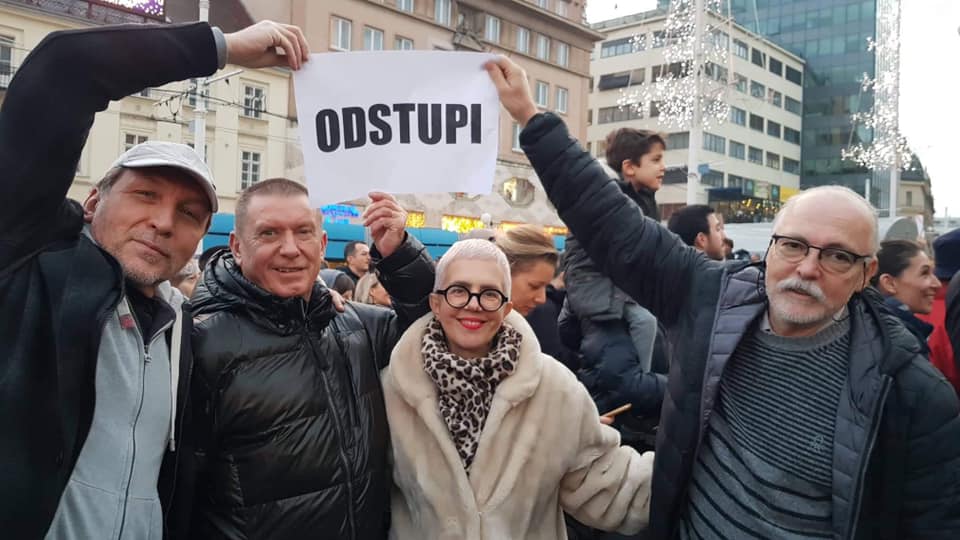
Clear Message from Zagreb Protesters: Resign!
Among the messages on the banners were "Resign", "Enough of Banditism", "Your Mayor is poisoning you and robbing you", "Bandić's godfathers: You will fall into Resnik" (Resnik is a garbage dump in Zagreb), "Put the right thing (Bandić) in the right place in Remetinec" (Remetinec is a Zagreb prison), "Zagreb must not be defined by Milan Bandić"," Whose benefitting from the garbage centers?" and "Bandić and his 26 bandits".
City Council 'Thieves' Voted for Waste Removal Cost Increase
They explained that these "26 thieves" are the city council members who voted for an increase in waste collection costs and will be voting on the GUP (General Urban Plan). The protesters also exhibited four garbage bags which contain the names of the mayor and his associates, Mirka Jozić and Sanja Jerković, with one bag saying "26 city deputies."
They called the bags "radioactive waste", which they say will be taken to Bandić and the Zagreb City Administration on Monday where they will be placed under a pine tree.
Gordana Pasanec, from the Siget Citizens’ Association, said that they were protesting because they were fed up with Milan Bandić's despotism, from the "golden toilets", and benches for 20, 30, 40 thousand HRK, his bullying of city government staff, and his insults directed at journalists and citizens.
She also pointed out that Zagreb is separating only 10 percent of its waste, there is no real waste management system or fair billing and Zagreb streets are flooded with waste.
"The chaos we are witnessing is the result of a long-standing (lack of) waste management policy implemented by the Mayor of Zagreb. There is no single justifiable reason for this; no increase in services except for the systematic robbery of citizens by the Mayor through waste collection, which has benefitted individuals and interest groups for 20 years.
Branka Genzić-Horvat from UZOR said that they have been protesting for 14 years and because they are fed up with what is happening and want to make Zagreb a better place to live.
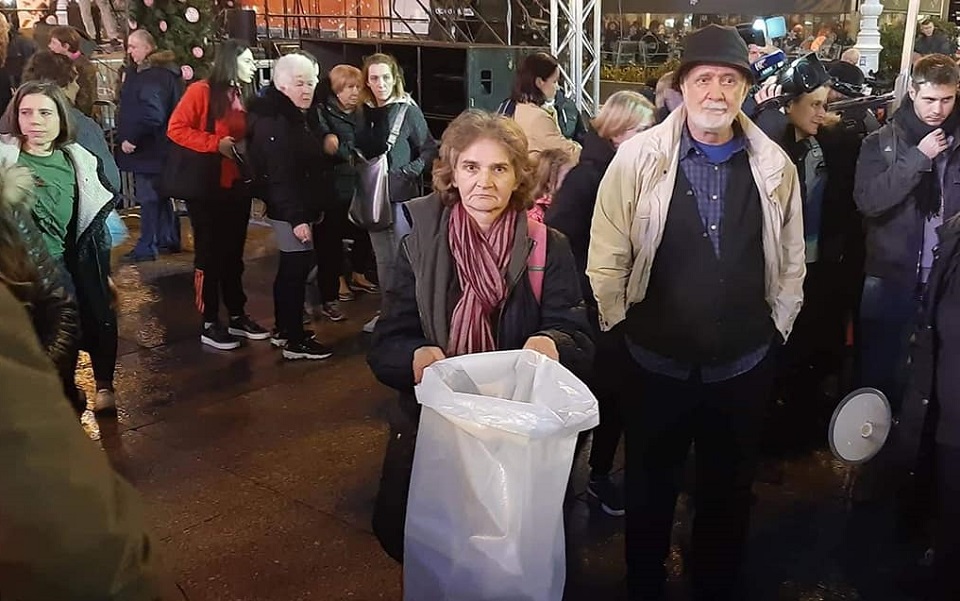
Pensioner in Wheelchair Calls Bandić 'Garbage'
Višnja Škreblin, who was introduced as the oldest activist, said that Bandić has consolidated his power (over the city) and has humiliated and belittled its citizens. “He says 'if you can't pay the cost of utilities and services, then you should leave Zagreb,’” which infuriated the wheelchair-bound pensioner, who publicly called Bandić "garbage."
"We have been witnessing this for 14 years. And it all started back in 2005 under the leadership of a mayor who has put himself at the forefront of these interest groups. The Waste Management Center is a continuation of concocted thievery, which this mayor carries out in the interest of specific groups and individuals. The Ministry of the Environment has backed an octopus who has ruled Zagreb and Croatia for many years," she said. She also said that for 14 long years they have been closely watching every step of this mayor and now the “water has reached her throat".
Ivan Kos from the Eco-Zagreb Association said that what Mayor Bandić is doing was "unacceptable".
Fled Scene of Drunk-Driving Accident in 2002
Bandić, a onetime member of SDP (Social Democratic Party) was elected mayor of Zagreb in 2000 and re-elected in 2001. In 2002, Bandić fled from the scene of a motor vehicle accident while under the influence of alcohol and was forced to resign.
The Zagreb SDP had the authority to nominate a new mayor, but the city council was so dominated by Bandić that it was questionable who would be able replace him. Eventually Vlasta Pavić took over, while Bandić retained a position as deputy mayor. However, he was eager to become mayor again, and blocked Pavić's development plans while pushing for an early election. In response, Ivica Račan (then head of SDP) tried to restrain Bandić's activities.
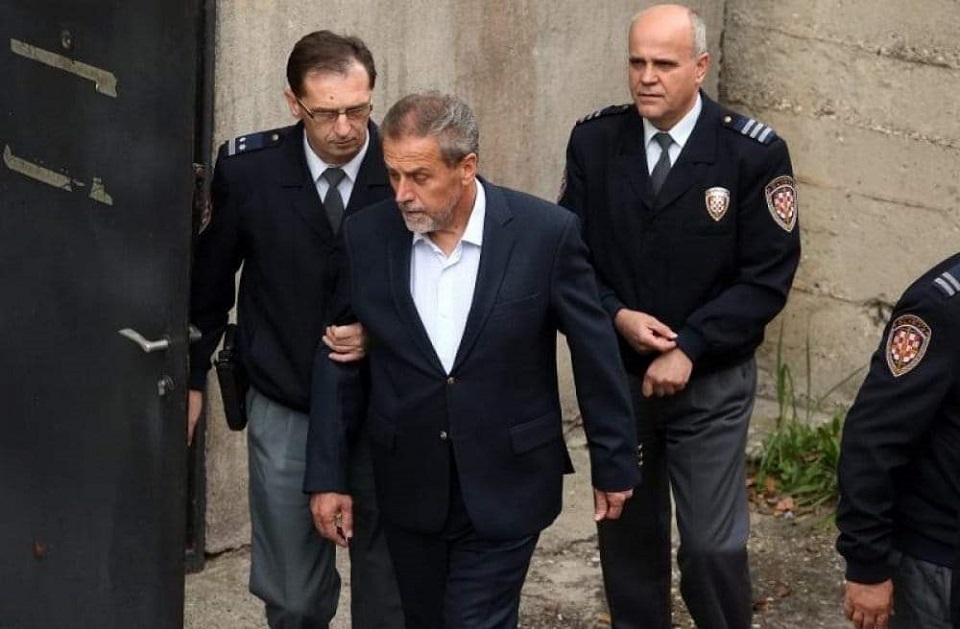
Successful Power Grab Led to 2005 Reelection
At that time, the law would not allow Bandić to serve a second term as mayor. Although Vlasta Pavić attempted to strike a deal to end their ongoing feud, but Bandić eventually succeeded in undermining her authority. Even though early elections were not held, he was re-elected mayor in 2005.
Bandić is currently serving his sixth term as Mayor of Zagreb. His administration has been defined by scandal and accusations of corruption. Bandić left SDP in 2009 and identified as an independent candidate for six years. In 2014, he was arrested on charges of corruption, bribery and organized crime, along with two other members of the Zagreb City Council. In 2015, he founded his own party, the Bandić Milan 365 – Labor and Solidarity Party. The 365 in his party’s name refers to his claim that he works for the city of Zagreb as mayor every day of the year.
In the 2017 local elections, Bandić narrowly defeated challenger Anka Mrak Taritaš. His current term ends in 2021.
Follow our Politics page to keep up with protests against the Bandić administration. For more information on upcoming protests against the Mayor, check out the Zagreb Te Zove (Zagreb is calling you) page on Facebook.
Croatia Court Decision: Gay Couple Allowed to be Foster Parents
For the very first time in Croatia, a Zagreb court rules that same-sex married couple Ivo Šegota and Mladen Kožić have the right to be foster parents, and the Ministry of Demography, which rejected their request to provide foster care last year, must implement the new decision within 60 days, this time in accordance with domestic and international legislation.
It stems from yesterday’s decision by the Zagreb Administrative Court, which annulled previous decisions including the refusals of the Center for Social Welfare and the ministry, according to Kristina Turčin/Jutarnji List on December 19, 2019.
Croatia Court Decision Final: No Appeal Allowed
“The court's decision is binding, and an appeal is not allowed, so this judgment is final. The written ruling has not yet arrived, but as stated during the announcement, the court accepted our argument in the lawsuit, based on Croatian regulations and the European Convention on Human Rights. As a result, the court ordered the relevant government agencies to implement the new decision in accordance with the judgment. We believe that the agencies will respect the court decision,” stated Sanja Bezbradica Jelavić, the attorney representing Ivo Šegota and Mladen Kožić.
“We are overjoyed. As we told the judge, this is the Christmas gift we didn't dare hope for,” Šegota revealed.
In 2015, he and his partner Mladen Kožić were among the first couples to enter a life partnership after the Life Partnership Act was passed in Croatia. Their desire to grow their family and raise children has existed for a long time.
Request to Adopt Rejected: Court Case Pending
“We have wanted to be parents for a long time. Therefore, shortly after our partnership ceremony, we submitted a request to the Center for Social Welfare to become adoptive parents, but were rejected immediately, which is why we have also initiated a lawsuit in the Zagreb Administrative Court, which is still pending,” according to Šegota.
They were not discouraged and started considering other options, such as foster care.
“We gave it a lot of thought. We are aware that this is temporary, rather than permanent childcare, and that foster parents are not adoptive parents, but we have concluded that this option is still a dream come true,” he continues.
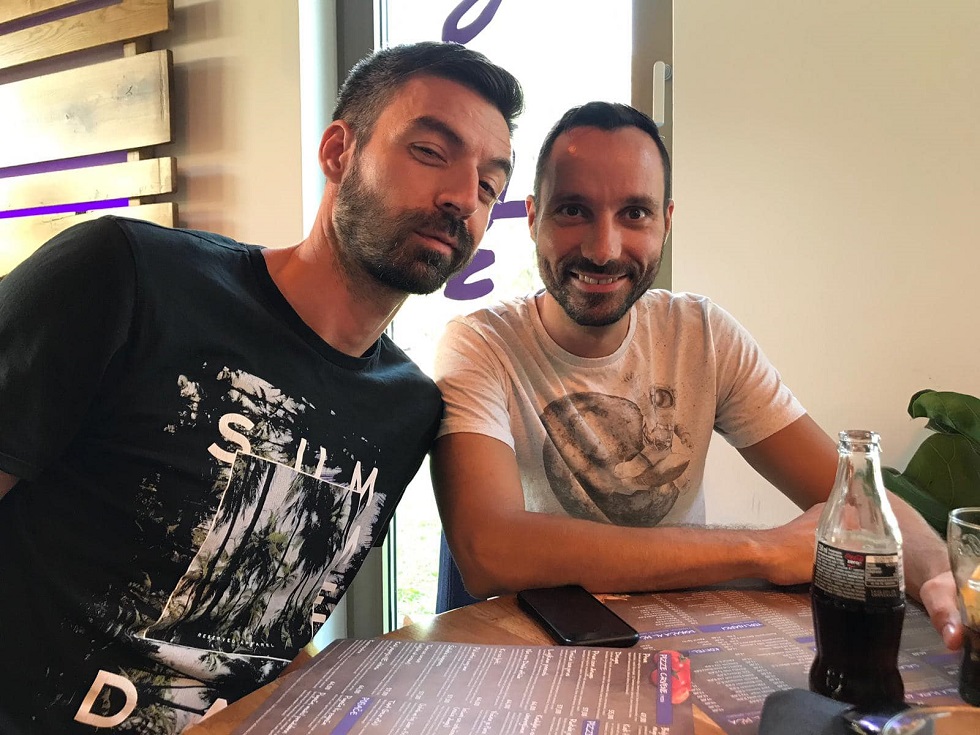
Applied to Become Foster Parents as Adoption Alternative
Therefore, Šegota applied with his life partner Mladen Kožić to the Zagreb branch of the Center for Social Welfare to become foster parents in the summer of 2017.
“Our application was very well received, especially by the psychologist and the social worker, who were particularly pleased when we announced that we were interested in fostering two or three children. Zagreb lacks foster families, especially those with the capability and desire to foster more than one child, which is why the centers are often forced to separate biological brothers and sisters,” he explained.
They both underwent an extensive psychological assessment process, during which they performed parenting skills tests, interviews, and discussed their motives for becoming foster care providers. A social history evaluation was also performed to assess their environment and family support network.
Center Rejects Foster Application Even Though Requirements Met
“We completely satisfied the requirements, received a positive assessment and everyone seemed pleased that this was happening. However, suddenly the center stopped contacting us. After the positive evaluation, we should have begun compulsory foster care training, which would have been followed by obtaining a foster care license. Suddenly, we could no longer get a response, and then in early December 2017, we were informed in writing that there were no legal prerequisites for initiating the licensing procedure because we are in a life partnership,” Šegota recounted.
They were very disappointed, he says, because after the initial response, they had hoped everything would be okay. After all, the Life Partnership Act clearly states that life partners are supposed to be legally on par with heterosexual spouses. As lawmakers have often pointed out, the only right that can be challenged is joint adoption of children - but not foster care, which is a profession and does not imply permanent childcare.
“We immediately submitted complaints to the Ministry of Demography about the center’s decision, but they rejected our appeal. We had no option but to institute legal proceedings,” they concluded.
Discrimination Lawsuit Initiated in July 2018
Their lawyer Bezbradica Jelavić initiated the lawsuit in July 2018. She noted that the center had begun the official evaluation of Šegota and Kožić in accordance with the Foster Care Act, but despite conducting a full procedure, which lasted four months, the center eventually rejected their request "because of a lack of legal presumptions.”
"Such a sudden detour in the evaluation process led us to the conclusion that there was a directive from above to treat these applicants differently. Considering the abrupt termination of the proceedings which were already underway, and even though the plaintiffs had met all the legal requirements, it's obvious that the Center for Social Welfare's treatment of the applicants was discriminatory due to their sexual orientation." The lawsuit further outlined the plaintiffs’ right to equal treatment and family life according to the law. National regulations, the constitution and international treaties guarantee the prohibition of discrimination as specified by the Convention for the Protection of Human Rights and Fundamental Freedoms.
"The plaintiffs state that they became aware that the Center for Social Welfare had abruptly discontinued another foster care evaluation involving life partners. This case, which had reached a later stage in the assessment, indicated that discrimination against same-sex couples exists within the organization," the lawsuit concludes, and cites several judgments from the European Court for Human Rights regarding similar cases, which were decided in favor of same-sex couples.
Well-Being and Interest of Children Should Come First
In the lawsuit, they also cautioned that the sole focus of the foster care profession should be the interest and well-being of children, not the sexual orientation of the foster parents, especially given the fact that the demand for foster parents is extremely high.
"Thus, by rejecting the request for foster care, the Center for Social Welfare in Zagreb violated not only the applicant's fundamental human rights, but also the right of a child or more children to quality accommodation and care, which they would receive in a stable family setting." According the center’s own evaluation, Šegota and Kožić demonstrated that they could provide this kind of environment, before their application was summarily rejected.
“The court fully accepted this argument in the lawsuit,” confirmed Bezbradica Jelavić, attorney for the couple.
Šegota and Kožić believe that the ministry and the foster care team at the Center for Social Welfare will respond quickly to the decision by the Zagreb Administrative Court. However, since the verdict has just been published and a written explanation is still pending, the Ministry of Demography has not yet been made aware of the details and could not comment or announce how it would react.
Excited to Finally Become Foster Parents
“We have patiently awaited this verdict. And we’re excited because we believe that we’ll be licensed as foster parents within the next few months and a child will arrive in our family. Or more children,” Šegota hopes.
He points out that this decision is completely in line with the foster care profession because, he emphasizes, foster parents do not have a right to a child, but every child has a right to a family.
"We hope that our family will be the right one for a child," he conveyed. Kožić adds that it is good that the decision has been redirected to the requirements of the profession because the rights of a child should not be the topic of daily political debate.
“The government, after adopting the new Foster Care Act, reiterated that they did not want to explicitly allow life partners to provide foster care because it contradicts their worldview, but at the same time they indicated that if the court rules otherwise, they will respect the court's decision. Now the court has provided children who don’t have a family with an opportunity for Santa Claus rather than a Grinch. Because it is the right of every child to grow up in a loving family, and not in an orphanage,” Kožić concludes.
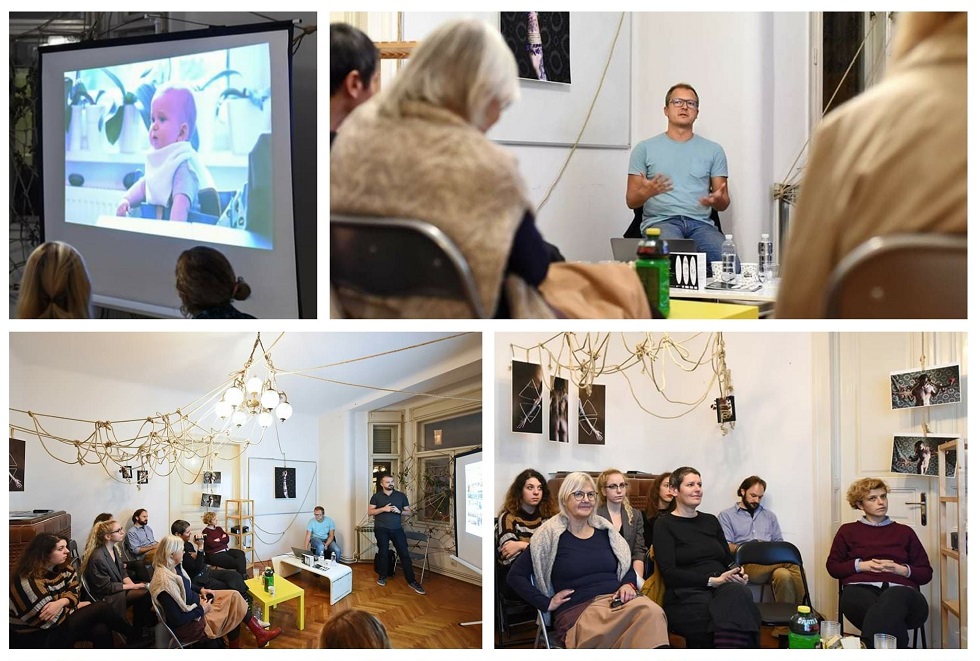
Founding Members of Croatia Based ‘Rainbow Families’
Šegota and Kožić are among the founders of the Croatia based group “Rainbow Families,” which is modeled after similar organizations worldwide, and brings together LGBTIQ couples and individuals who have children, want to have children, or would like to learn more about the rewards and challenges of raising a family.
Members of the organization first came together in 2011 in a psychosocial support group organized by the Zagreb Pride Association, led by psychologists Iskra Pejić and Matee Popov. After completing two support group cycles, the group members continued to meet and socialize as an informal citizens' initiative. Then, they established a forum and a website. In 2017, their association was officially registered. In 2018, they published an illustrated book titled "My Rainbow Family,” which was first book in Croatia to feature children with same-sex parents. In 2019, they organized the first international conference on rainbow families called “Our Children Are Fine.” Rainbow Families regularly organizes group activities and gatherings, which continue today.
For non-traditional families in Croatia, sharing experiences with others in similar circumstances can be very rewarding and fulfilling. In Rainbow Family meetings, LGBTIQ parents, and those planning parenthood, are given the opportunity to share their experiences and get to know each other.
Full Joint Adoption by Same-Sex Couples Legal in Seventeen European Countries
Full joint adoption by same-sex couples is legal in seventeen European countries: Andorra, Austria, Belgium, Denmark, Finland, France, Germany, Iceland, Ireland, Luxembourg, Malta, the Netherlands, Norway, Portugal, Spain, Sweden and the United Kingdom. Another five: Estonia, Italy, Slovenia, San Marino and Switzerland permit stepchild adoption in which the registered partner can adopt the biological and the adopted child of his or her partner in some cases. In Croatia, a life partner may become a partner-guardian over their partner's child, which is somewhat comparable to stepchild adoption. The new policy in Croatia follows that of Greece in which same-sex couples in a civil partnership may become foster, but not adoptive, parents.
Follow our Politics page for more information on LGBTIQ rights in Croatia.
Croatian Presidential Debate: Candidates on Abortion, Religion, Gay Pride
Yesterday evening HRT (Croatian Radio Television) moderated a debate between all eleven presidential candidates. It lasted over two and a half hours.
Here is a summary of the top three candidates’ (Kolinda Grabar-Kitarović, Zoran Milanović, Miroslav Škoro) positions on abortion, religious education, “Za dom spremi” and gay pride – according to Index on December 18, 2019.
Croatian Candidates’ Opening Remarks
Kolinda Grabar-Kitarović: I have been your president for 5 years and have been among our people and listened to your problems. I have also repositioned Croatia from a region in Central Europe to a place on the Mediterranean, where it belongs. I’ve raised the issue of demography and I was the first Croatian diplomat.
Zoran Milanović: I have something to offer and want to make our country happier and freer. I have extensive experience and consider politics an honorable job. It is up to our citizens to decide.
Miroslav Škoro: Given that this game has begun, I would like to say that I am sorry that there wasn’t a debate on commercial television. I apologize for that. Kolinda is responsible for this and she must apologize.
Corruption in Croatian Society: How would you fight against it?
Kolinda: Constitutional obligations allow a president to be involved in secret service operations. I would build a collaborative relationship with secret services to address this problem. I've been fighting corruption for years, and it's time to recruit young talent for jobs in secret services.
Milanović: I’m aware of the limitations of a president in this area. The president may nominate the President of the Croatian Constitutional Court and can set an example by whom he chooses to associate with. He sends a signal to the public by paying attention to whom he hangs out with.
Škoro: When it comes to corruption, it is an obstacle to doing business in the Republic of Croatia. I am the only entrepreneur here who deals with business and encounters real problems.
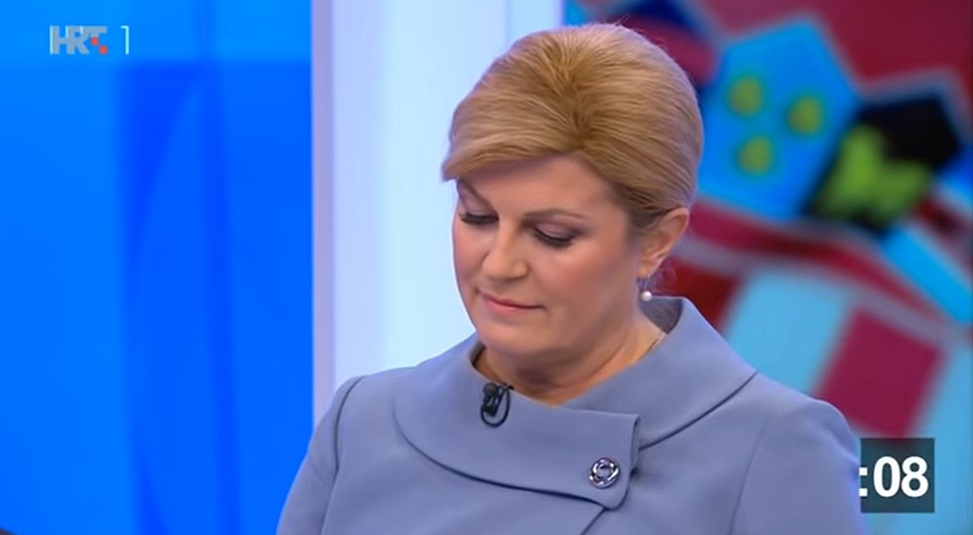
Should the Croatian army be sent to the borders?
Kolinda: The military should come to the aid of the police in border control. Presently, the police are saying they don't need help. The border situation in 2015 was chaos.
Milanović: It’s mindless statement to call the 2015 situation chaos. We did a fine job of transporting people. The police need help now.
Škoro: The border of every country is sacred. There are laws regarding the residence and movement of foreigners. The border absolutely must be protected. There are three types of migrants - refugees, people seeking political asylum and people who want to get from point A to point B. If necessary, the military should be sent to the border.
Should Croatia block Serbia's entry into the EU?
Milanović: Vučić is one topic. Serbia is another.
Škoro: The destruction of Vukovar, Škabrnja ... We all know who’s responsible. We need to address the issue of missing persons, borders and reparations for people who were held (by Serbs) in detention camps. Serbia needs to join the EU only after it meets the highest democratic standards. I will not raise my hand for Serbia's EU accession until that happens.
Kolinda: We need to talk about how to ensure a livelihood for our citizens. We will insist that Serbia meets all the conditions for accession, and they must come to terms with their past. I will absolutely insist that Serbia accounts for the people who are still missing (from the Homeland War in the 1990s) before they join the EU.
What kind of foreign policy should Croatia engage in with Bosnia?
Milanović: After 30 years of missteps, answering this question in one minute would be an insult to Bosnia. No one deserves to have their country summarized in one minute. I support a united Bosnia; half a million Croatians live there.
Škoro: Bosnia is a state of the Croatian people. Currently, Croatians in Bosnia are not autonomous. And Croatians did not elect the government led by Komšić.
Kolinda: Croatians in Bosnia are not the part of the diaspora. Rather, they are indigenous people there. We would support a good neighbor policy but are also fighting for the rights of the Croatian population there, without compromise. Bosnia has a strategic component for us. And to everyone who refers to Croatians in Bosnia as part of the voting machinery – that’s a grave insult.
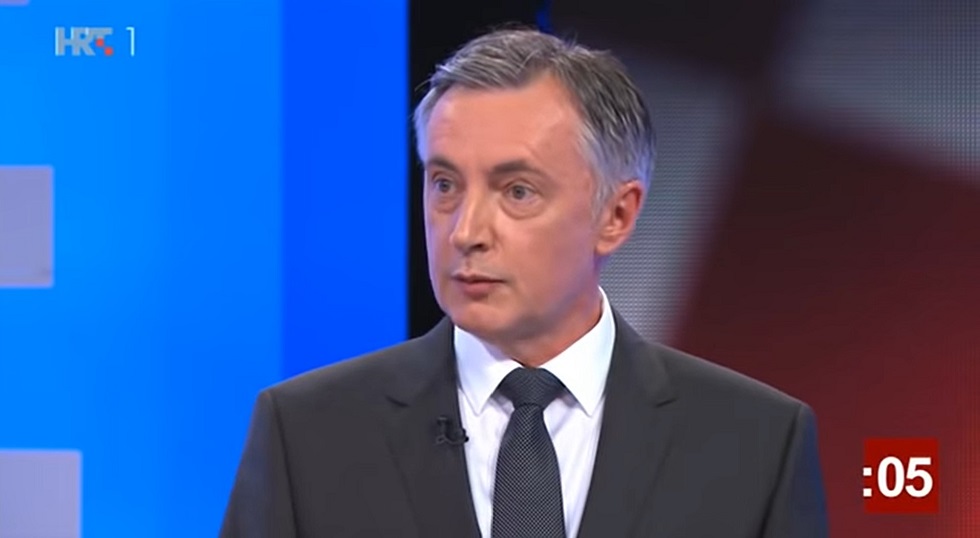
Should official signs in Vukovar include the Cyrillic alphabet – Yes or No?
Milanović: This is a matter of law; the rule of law. I would deal with this issue the same manner again. No one is offended by the co-existence of the Cyrillic and Latin alphabet in Vukovar cemeteries. I’ve acknowledged that perhaps I moved a little too quickly (as Prime Minister), and I could apologize for that. The HDZ (Croatian Democratic Union), the party of Kolinda and Škoro, is the one who created the legal framework in Vukovar. That's the truth and the whole truth. I enforced the law which HDZ put in place.
Škoro: I haven’t heard so much hate speech in one place for a very long time.
Kolinda: I've been going to Vukovar for years, for the (commemorative) days year after year. Their concerns are existential concerns, but war wounds still fester. Justice has still not been served. Why push for the Cyrillic alphabet before justice has been served? This issue needs to be addressed first, and then it will be right time to address the Cyrillic (signage).
Abortion?
Milanović: It's a matter of choice. It's a difficult situation, but it's first and foremost a woman's choice.
Škoro: I am against abortion and for protecting life from conception to death.
Kolinda: Life begins from conception to natural death. A ban on abortion would solve nothing and cause even more health problems. I am more for education, especially for young people, women and men, and for facilitating adoption and other measures which will reduce the number of abortions in the Republic of Croatia.
Religion in Croatian schools?
Škoro: The church is deeply rooted in the Croatian identity. I don't see why having religious education in schools should be a problem. I spent my entire childhood and youth in religious education and didn’t learn anything harmful there.
Kolinda: Religious education is an elective subject. I don't see what the problem is. Croatia offers religious instruction, which is a topic of culture in general. And children who do not go to church have an opportunity to learn something about other faiths.
Milanović: Religious education can be offered, but only as an elective course. But not in the third hour of school – that’s not an elective class. It must be at the end of the school day, during the last hour.
Would you participate in a gay pride or a pro-life march?
Škoro: We are discussing peripheral matters. Sexual orientation is a private matter for every person and should not be flaunted publicly, and I would gladly attend a pro-life march.
Kolinda: I do not know why these two demonstrations must be in opposition to one another. I only participate in the commemoration march (in Vukovar). I am responsible for all our citizens.
Milanović: Three days ago the Germans announced that homosexuality is normal. What else can I say?
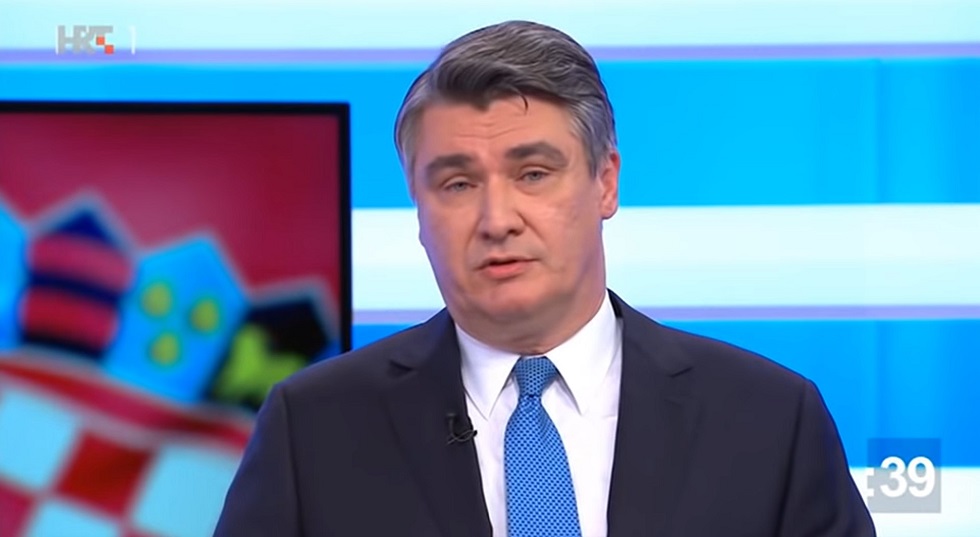
What does Franjo Tuđman mean to you? Tito?
Kolinda: For me, Tuđman is of the same caliber of Dr. Ante Starčević. I also established the Velered (highest honor in Croatia) for Dr. Tuđman. Tito played a positive role in anti-fascism, but he committed crimes after that.
Milanović: Broz, Radić, Tuđman and Krleža - these are people who defined the Republic of Croatia in the 20th century.
Škoro: Milanović is responsible for Lex Perković (Josip Perković is the former director of Yugoslav-era Croatian secret police).
Milanović: Perković was a HDZ guy who ate out of Tuđman’s hand.
What are your views on the slogan “Za dom spremi” (Ready for the homeland)?
Škoro: It's a salute that was used to say goodbye during the time of the NDH (Independent State of Croatia), but it was also on the sleeves of HOS members (among the first organized Croatian military defense forces in the Homeland War in the 1990s) and I don’t have a problem with that.
Kolinda: We need to stop discussing ideological issues. “Za dom spremni” was an Ustasha salute, but it was also on the insignia of the HOS forces and it had an entirely different meaning then.
Milanović: The Croatian Constitutional Court delivered two judgments which determined it to be hate speech.
Candidates’ Closing Remarks
Kolinda Grabar-Kitarović: I invite you to go to the polls on December 22nd. As your president, I have traversed every inch of this country and have developed my policies and program based on your problems, hopes and dreams. We must improve our situation. All I have heard tonight is a wish list, and rarely from anyone who really has a program. I am offering you action and diligence. Instead of inaction, I am committed to growth, sincerity and progress among our people and not arrogance. I am offering a message of unity: Croatia is for everyone.
Zoran Milanović: As your president, I will restore fundamental dignity and decency. As a politician I have worked hard and have made mistakes: abolished parliamentary pensions and opposed banks. Times change, I do not seek greater powers (within the Croatian presidency) because I consider those to be a path to tyranny. The president must maintain an objective distance and not be involved in money-related matters and staff decisions. I am here to serve and to seek your trust and vote.
Miroslav Škoro: This time (the presidential debate) was useful for viewers to see how futile this process is. I am a man who fights against the system. I am proposing radical changes and am seeking increased powers (within the Croatian presidency). On December 22, we will change the Constitution. I worry about one thing: my election observers have not yet received SEC (State Electoral Commission) accreditation and it all smells like election fraud.
Follow our Politics page for more information on the presidential candidates and the upcoming elections.

